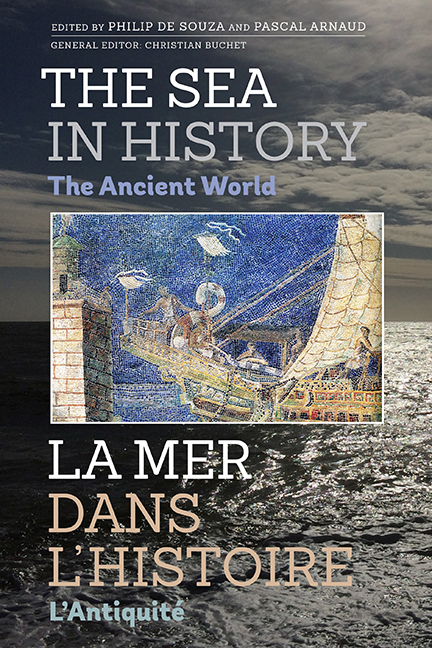Book contents
- Frontmatter
- Contents
- List of Illustrations
- List of Contributors
- Introduction générale et remerciements par Christian Buchet
- General introduction and acknowledgements
- Introduction (français)
- Introduction (English)
- La mer est le propre d'Homo sapiens
- PREHISTORICAL CASE STUDIES
- HISTORIAL CASE STUDIES: The Ancient Near East and Pharaonic Egypt
- HISTORICAL CASE STUDIES: The Mediterranean world
- HISTORICAL CASE STUDIES: The Indian Ocean and the Far East
- Conclusion (français)
- Conclusion (English)
- Conclusion générale par Christian Buchet
- General conclusion
- Comprendre le rôle de la mer dans L'histoire pour éclairer notre avenir
- Understanding the role the sea has played in our past in order to shed light on our future!
Conclusion (English)
Published online by Cambridge University Press: 20 April 2017
- Frontmatter
- Contents
- List of Illustrations
- List of Contributors
- Introduction générale et remerciements par Christian Buchet
- General introduction and acknowledgements
- Introduction (français)
- Introduction (English)
- La mer est le propre d'Homo sapiens
- PREHISTORICAL CASE STUDIES
- HISTORIAL CASE STUDIES: The Ancient Near East and Pharaonic Egypt
- HISTORICAL CASE STUDIES: The Mediterranean world
- HISTORICAL CASE STUDIES: The Indian Ocean and the Far East
- Conclusion (français)
- Conclusion (English)
- Conclusion générale par Christian Buchet
- General conclusion
- Comprendre le rôle de la mer dans L'histoire pour éclairer notre avenir
- Understanding the role the sea has played in our past in order to shed light on our future!
Summary
Antiquity lends itself particularly well to the work of Global History in which Océanides has invited us to participate. More than the simple juxtaposition of case studies to which Global History too often leads, this is an opportunity to examine the establishment of connections in the Old World and the impact of the seas on the development of societies and cultures which, since the dawn of time, have undertaken to make the seas an ally and a tool. As we have pointed out in this volume's introduction, chronological determination does not make it possible to compare like situations, because of the asymmetry of levels of political and economic development reached by the Old World and what constitutes, nearly a millennium after the end of Antiquity, ‘new worlds’. As such, the attentive reader of this work will see that one must wait until the end of the pre-Colombian era to find situations in South America comparable to those that we know dating from almost two millennia ago in the Old World. Unfortunately, polarisation of the Old World is inevitable if one wishes to make comparisons between comparable situations. Documentary asymmetry also leads us to favour areas frequented by citizens of Mediterranean states. Not only did they leave behind a greater number of works which have long been studied, but maritime archaeology in its various forms, on land and underwater, which is a major source, has only recently been developed beyond the Mediterranean world. Our knowledge of the Indian Ocean has progressed well over the last ten years, but remains in its early stages. That of western Africa remains entirely unwritten, and interest in the maritime past of China is just beginning. For these reasons, a comparative approach to the whole of the Old World's ancient maritime history has become possible, but its outcome remains highly unbalanced.
- Type
- Chapter
- Information
- The Sea in History - The Ancient World , pp. 617 - 644Publisher: Boydell & BrewerPrint publication year: 2017

